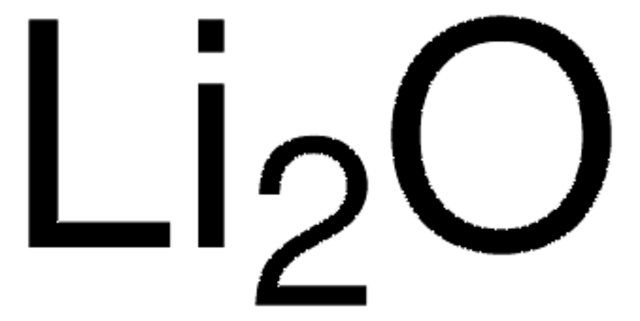254274
Lithium hydroxide monohydrate
99.95% trace metals basis
Synonym(s):
Lithine hydrate
About This Item
Recommended Products
Quality Level
Assay
99.95% trace metals basis
form
crystalline
greener alternative product characteristics
Design for Energy Efficiency
Learn more about the Principles of Green Chemistry.
sustainability
Greener Alternative Product
impurities
≤550.0 ppm Trace Metal Analysis
application(s)
battery manufacturing
greener alternative category
SMILES string
[Li+].O.[OH-]
InChI
1S/Li.2H2O/h;2*1H2/q+1;;/p-1
InChI key
GLXDVVHUTZTUQK-UHFFFAOYSA-M
Looking for similar products? Visit Product Comparison Guide
Related Categories
General description
Application
- To synthesize Olivine LiFePO4 nanoplates with different crystal orientations by glycol-based solvothermal process. It demonstrated that the crystal orientation of cathode nanoplates plays an important role in the performance.
- As a precursor for the synthesis of LiFePO4 platelets under hydrothermal synthesis conditions. It exhibited homogeneous particle size distribution, greater electrochemical performances and cycle life, and morphology control.
- To synthesize Ni-rich Li[NixCoyMn1–x–y]O2 gradient cathodes (NCM). These cathodes exhibited enhanced cycling and chemical stability due to their strong crystallographic texture, unique particle morphology, and highly correlated particle orientation.
- As a precursor to prepare porous salt hydrate-based composites for low-temperature thermochemical heat storage.
- As an electrolyte additive in lithium-ion batteries.
Signal Word
Danger
Hazard Statements
Precautionary Statements
Hazard Classifications
Acute Tox. 4 Oral - Eye Dam. 1 - Skin Corr. 1B
Storage Class Code
8B - Non-combustible corrosive hazardous materials
WGK
WGK 1
Flash Point(F)
Not applicable
Flash Point(C)
Not applicable
Personal Protective Equipment
Choose from one of the most recent versions:
Already Own This Product?
Find documentation for the products that you have recently purchased in the Document Library.
Customers Also Viewed
Articles
Lithium-Ion Battery Performance: Dependence on Material Synthesis and Post‑Treatment Methods
Our team of scientists has experience in all areas of research including Life Science, Material Science, Chemical Synthesis, Chromatography, Analytical and many others.
Contact Technical Service











